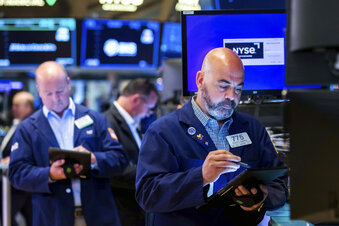Stocks start higher as Salesforce.com leads gains for tech
3 min read
In this photo provided by the New York Stock Exchange, trader Fred DeMarco, right, works on the floor, Tuesday, May 31, 2022. U.S. stocks are slipping in midday trading on Tuesday, as Wall Street nears the end of a tumultuous month, bruised by worries about a possible recession, inflation and rising interest rates. (Courtney Crow/New York Stock Exchange via AP)
Stocks are off to a higher start on Wall Street Wednesday, led by gains in technology companies following a big earnings beat by Salesforce.com. The maker of customer relations software soared 13% after turning in results that surpassed analysts forecasts and raising its outlook for the year. Other big tech companies including Apple and Microsoft were also higher. The S&P 500 rose 0.5%, the tech-heavy Nasdaq was up 1% and the Dow Jones Industrial Average climed 0.5%. Crude oil prices rose 2% and bond yields edged higher. The yield on the 10-year Treasury, which helps set interest rates on mortgages, rose to 2.85%.
THIS IS A BREAKING NEWS UPDATE. AP’s earlier story follows below.
U.S. markets rose modestly ahead of the opening bell Wednesday and the price for a barrel of oil resumed an upward trajectory after the European Union this week blocked most oil imports from Russia.
Futures for the S&P 500 gained 0.4% and futures for the Dow industrials rose 0.2%.
Global shares were mixed after Wall Street closed out a volatile month of trading that’s been shaped by rising inflation and interest rates, as well as some anxiety over the possibility of recession.
Germany’s DAX gained 0.3%, the CAC 40 in Paris was unchanged and Britain’s FTSE 100 edged 0.2% lower at midday.
Oil prices rebounded after declining from nearly $120 per barrel Tuesday, when prices surged after the European Union agreed to block the majority of oil imports from Russia because of its invasion of Ukraine.
Prices ultimately fell Tuesday on speculation that the OPEC plus cartel of oil producing nations might ease production limits and offset lost oil output from Russia. But just hours before U.S. markets opened, benchmark U.S. crude had climbed $1.25 to $115.92 per barrel in electronic trading on the New York Mercantile Exchange. It closed down 40 cents at $114.67 on Tuesday.
Brent crude, the price basis for international oil trading, picked up $1.52 to $117.12 per barrel.
In Asian trading, Tokyo’s Nikkei 225 advanced 0.7% to 27,457.89 after Japan’s parliament enacted a $21 billion extra budget to tackle soaring fuel and food prices following Russia’s invasion of Ukraine.
The extra budget, for the current fiscal year that started April 1, will fund part of a $48 billion emergency economic package the government adopted in April. It includes subsidies to oil wholesalers to minimize the impact on consumers.
In Sydney, the S&P/ASX rose 0.3% to 7,234.00.
Hong Kong’s Hang Seng fell 0.4% to 21,323.47 and the Shanghai Composite index shed 0.1% to 3,182.16. Both indexes rose sharply on Tuesday as Shanghai eased its stringent anti-virus limits on businesses and other activities.
South Korea’s markets were closed for a holiday.
The jump of more than 50% for oil prices so far this year is a big part of the high inflation sweeping the world. A report Tuesday showed inflation in the 19 countries that use the euro currency hit 8.1% in May, the highest level since records began in 1997.
Through mid-May, the S&P 500 tumbled to seven straight losing weeks for its longest such streak since the dot-com bubble was deflating two decades ago. Slowing data on the U.S. economy has accentuated worries that high inflation will force the Federal Reserve to raise interest rates so aggressively that it will cause a recession.
Stocks have managed to avoid a full-blown bear market, at least so far, with the S&P 500 yet to close more than 20% below its record. Speculation has grown that the Fed may consider a pause in rate hikes at its September meeting.
Beginning Wednesday, the Fed will begin allowing some of the trillions of dollars’ worth of Treasurys and other bonds that it amassed through the pandemic to roll off its balance sheet. Such a move should put upward pressure on longer-term Treasury yields, and it’s one way the Fed is trying to stamp out inflation by slowing the economy.
In other trading, the dollar rose to 129.55 Japanese yen from 128.70 yen on Tuesday. The euro slipped to $1.0705 from $1.0735.
Traders are waiting on manufacturing data for Europe and the U.S. due later Wednesday.








